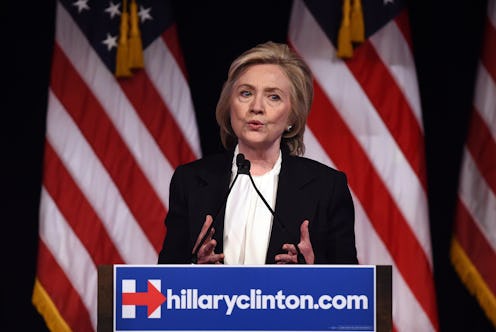News
Hillary Clinton Gives Big Economic Policy Speech
On Monday morning, Hillary Clinton delivered the first major economic speech of Clinton's campaign, laying out a feminist, pro-immigration, pro-small businesses plan to stabilize the economy and maximize growth. Along with her explicit plan to help close the pay gap, Clinton openly called for "fair pay, fair scheduling, paid family leave," adding, "These challenges have been dismissed by some as women's issues. Well, those days are over." She also posited immigration reform as a key factor for growth, noting that with reforms in place, the U.S.' economy would see a boost. This effect of immigration reform has been ignored by many candidates, but is routinely brought up by think tanks and immigration activists.
There were several references to Clinton's rivals on the other side of the aisle, often referred to in sweeping terms — it's hard not to, now there are almost 20 of them — and on their unfocused immigration policies. In particular, on Jeb Bush's notorious call last week for Americans to work longer hours, Clinton quipped: "He must not have met many American workers." (Jeb, you had to expect that one.)
Clinton has been vague on many aspects of her campaign so far; this speech marks the most specific outlining of her platform. Regarding tax reform, Clinton noted that she supported the Buffet Rule, "which makes sure that millionaires don’t pay lower rates than their secretaries," and she noted that the United States "should set a high bar for trade agreements." She made a jab at Wall Street when she noted that bankers earned a shocking amount in comparison to everyday Americans, and in regard to unions, said, "If we want to get serious about raising incomes, we have to get serious about supporting union workers."
"I'm committed to seeing every 4-year-old in America have access to high quality pre-school," she said.
"When all Americans have the chance to study hard, work hard, and share in our country's prosperity, that's fair growth," she added. "Workers are assets. Investing in them pays off. Higher wages pay off. And training pays off."
Clinton went on to call out big banks like HSBC for allegedly thinking they're "too big to fail," and says that she was "alarmed" by the pre-2008 crash and "called for addressing the risks of derivatives."
"Let's go back to making decisions that rely on evidence more than ideology," she concluded. "That's what I will do as president."
